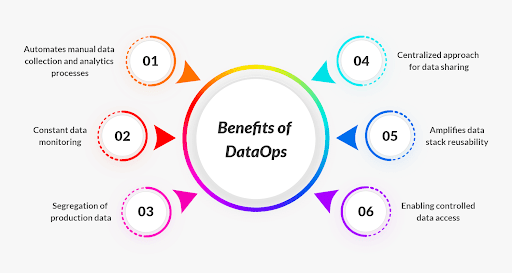Data Operations
From raw data to real results. Optimize efficiency, and maximize value with DataOps
DataOps as a Service
DataOps
The effective leader’s approach towards business challenges
Data Decoded: Embrace the Challenge, Redefine Strategy
Data silos, quality issues, complexities of governance, and inefficient processes are challenges Chief Technology Officers (CTOs), Chief Information Officers (CIOs), and Chief Data Officers (CDOs) deal with on a regular basis. These issues affect regular business decision-making and create an opportunity for the implementation of DataOps.
DataOps strategies are imperative as it promotes collaboration and automated testing, ensures data quality, breaks down data silos, improves governance and compliance measures, simplifies data integration, and facilitates scalability.
A streamlined approach that DataOps provides enables organizations to leverage their data and derive great value from them, actively achieving business goals.

Dataops
DataOps Consulting
DataOps consulting involves providing expertise and guidance on implementing and optimizing DataOps practices. Unlock the full potential of your data journey with our expert DataOps consulting services.
- Data Strategy Development
- Data Assessment & Audit
- Data Pipeline Design & Automation
- Data Catalog and Metadata Management
- DevOps and DataOps Integration
- Data Analytics and Visualization
- Data Resilience and Disaster Recovery
- Custom DataOps Solutions
DataOps
DataOps Services
DataOps services streamline and optimize data workflows for enhanced efficiency and insights. Maximize data efficiency with our proven DataOps services.
- Data Ingestion
- Data Transformation and Processing
- Data Integration
- Data Quality Management
- Data Warehouse Management
- Data Lake Implementation and Management
- Data Lifecycle Management




Real Results
DataOps as a Service, Transform your data into strategic assets. With CanData you get to transform the chaos of information into insights that empower business.
Adoption of DataOps
According to a survey by IDC in 2020, it was reported that 90% of global organizations were expected to adopt a DataOps approach by 2021.
Data Management Challenges
In a survey conducted by Experian in 2020, 76% of organizations cited data quality as their biggest challenge in achieving their goals around digital transformation.
Data Silos
A survey by NewVantage Partners in 2019 found that 92.4% of C- level executives believed that breaking down data silos was a significant challenge for their organizations.
Data Governance Concerns
In a Gartner survey in 2020, 63% of respondents identified data governance as a key challenge in their organizations.
Agility and Speed
A Forrester Research survey in 2019 found that 79% of global data and analytics decision-makers were focusing on improving their ability to deliver insights in real-time.
How to transform from legacy data management processes to DataOps.
To transition from legacy data management processes to DataOps, organizations should start with a comprehensive assessment, secure executive buy-in, and cultivate a culture of collaboration and agility.
Implementing automation, continuous integration, and data quality management practices is crucial, along with introducing collaborative tools. Begin with pilot projects, emphasizing iterative improvement, and ensure teams are well-trained in DataOps principles.
Establish scalable and flexible processes, monitor performance, and communicate successes regularly. This phased approach allows organizations to evolve towards a more efficient, transparent, and adaptable data management framework.
Embrace innovation with CanData.ai's DataOps as a Service.
The first step towards flawless operations begins here.
Core Components of DataOps

Automation
Involves the use of automated processes and tools to streamline and accelerate tasks such as data integration, testing, validation, and deployment.

Continuous Integration
Incorporates continuous integration practices, similar to those in software development, to merge code changes regularly, ensuring the smooth and consistent integration of data processes.

Continuous Deployment
Extends continuous integration by automating the deployment of data pipelines, allowing for quicker and more reliable delivery of data to end-users.

Version Control
Utilizes version control systems to manage changes to code, configurations, and other artifacts, ensuring traceability and reproducibility of data processes.

Monitoring and Logging
Implements robust monitoring and logging systems to track the performance of data pipelines, detect issues, and gather insights into the behavior of the data processes.

Agile Methodologies
Applies Agile principles, such as iterative development and flexibility in responding to changing requirements, to data-related projects and processes.

Feedback Loops
Establishes mechanisms for gathering feedback from users, monitoring systems, and stakeholders to continuously improve and optimize data processes.

Data Quality Management
Implements processes and tools for automated testing, validation, and monitoring to ensure the consistency, accuracy, & reliability of data.

Empower your operations with data
Unleash business potential with DataOps implementation

Revolutionize with Next-Gen Data Tactics
Advantages of DataOps
An agile approach is required to facilitate data-driven transformation across the entire supply chain. This is from your infrastructure to your processes and your people. DataOps brings these elements together, accelerating the cycle times and improves the performance with the potential to achieve your business goals quicker.
More agile analytic processes
In order to become truly data driven, agile and extract real-tik insights, success in data operations implementation is imperative. It helps automate manual tasks, reduce the analytics cycle time, and frees up resources, helping you to focus on what is important. It provides the perfect opportunity to stay agile while technology evolves.
Data democratization
Governed and vetted data becomes easily accessible and universally available with DataOps. It provides all the analytical insights to data scientists as and when it is required. The insights can also be extended to a broad set of professionals who have a focused expertise on associated matters. This includes users who utilize mobile devices and IoT, or at any point of customer interaction, and help optimize operations and customer experiences.
Consistent oversight for data delivery
Data tools such as catalogs and indexes enable IT teams to design a governance process with access to avoid data-decision variability and chaos. IT can also achieve scale and agility by leaving data inrepositories on-premise and in the cloud. This provides users timely access to enterprise-ready data while layering in quality assurance.
Complete collaboration
It is faster and easier for data scientists and analysts to collaborate. Essentially, different units of the business can come together to collaborate around the analysis of data and sharing of results. DataOps is a great medium to address the business alignment organizations consistently demand. Especially, if the businesses are on a growth trajectory. An added advantage is that data operations affect the entire organization by delivering overall value, unlike traditional task forces that tackle niche issues.

What is not DataOps?
Lorem ipsum dolor sit amet, consectetur adipiscing elit. Ut elit tellus, luctus nec ullamcorper mattis, pulvinar dapibus leo.
Solutions for tomorrow by implementing DataOps today
Fortify your business with future-ready measures.
